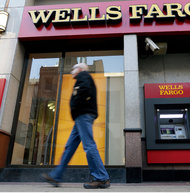 Matt Rourke/Associated PressA Wells Fargo branch in Philadelphia.
Matt Rourke/Associated PressA Wells Fargo branch in Philadelphia.
8:40 p.m. | Updated
Wells Fargo has turned its mortgage business into an enormous profit machine. The San Francisco-based bank posted earnings of $5.1 billion in the fourth quarter, a 24 percent increase from the previous year.
But its strong gains may not be sustainable, unless interest rates drop significantly or the housing market recovers substantially. Both are long shots.
“Rates really don’t have to go up very much to discourage a whole swath of people from returning to the housing market,” said Lance Roberts, chief economist at StreetTalk Advisors, an investment advisory firm.
Related Links
In recent years, Wells Fargo has aggressively expanded its mortgage business, a strategy that has helped drive record profits. The company reported net income of $18.9 billion in 2012, up 19 percent from 2011. Revenue rose 6 percent in the same period.
“We saw robust growth across the entire bank, proving that there is a lot of value in a strong, diversified business,” said Timothy J. Sloan, chief financial officer of Wells Fargo.
But after 12 consecutive quarters of rising profits, Wells Fargo may find it difficult to keep up the pace.
The bank’s recent mortgage profits largely reflect the government’s efforts to stimulate the economy, rather than a robust recovery in the housing market.
As the Federal Reserve has cut interest rates, millions of borrowers have refinanced their home loans to reduce costs. Refinancing accounted for 72 percent of Wells Fargo’s mortgage origination in the fourth quarter.
That business has been especially lucrative of late.
Banks pass on most of their mortgages to government entities like Fannie Mae and Freddie Mac, which guarantee that the loans will be repaid. With the guarantee attached, banks sell the mortgages to bond investors and book a financial gain.
Profits have ballooned with the government intervention. The Fed has been a big buyer of mortgage bonds in an effort to drive down interest rates. But banks have not cut ordinary borrowers’ rates by the same amount.
That means the difference, or spread, between the rates increased last year. Wells Fargo’s gains from this activity totaled $10.3 billion in 2012, more than double the previous year.
Those gains may be hard to beat.
While the Fed has promised to purchase more mortgage bonds, interest rates may not fall much further. If mortgage rates stagnate or rise, fewer borrowers are likely to refinance or buy a house. And if the mortgage bond market weakens, banks will make less of a gain when selling the mortgages.
Already, refinancing activity appears to be slowing. In the fourth quarter, Wells Fargo handled $125 billion of mortgage originations, up 4 percent from the previous year. But loan production was higher earlier in the year, peaking at $139 billion in the third quarter.
At the same time, the Fed’s low rates are actually hurting other parts of the business. An important measure of a bank’s overall lending profitability, the net interest margin, has eroded. In the fourth quarter, Wells Fargo’s net interest margin dropped slightly to 3.56 percent, from 3.89 percent a year earlier.
Investors shrugged off the strong profits because of such concerns. Wells Fargo’s shares fell slightly on Friday, to $35.10, a 0.85 percent drop.
In an effort to assuage investors’ concerns about the refinancing business, Mr. Sloan, the chief financial officer, said in a conference call on Friday that he saw “billions of dollars in refinancing opportunities.”
Housing market numbers support his optimism. Over 70 percent of mortgages had interest rates above 4 percent in the fall, according to CoreLogic, a housing data firm. Some of those borrowers would benefit financially from refinancing, given that the interest rate on fixed, 30-year loans is 3.4 percent.
If the refinancing boom does sputter, a significant increase in new mortgages could help fill the void. That depends largely on the health of the housing market. While house prices posted annual gains last year, the recovery is far from robust.
Wells Fargo’s servicing business, in which the bank collects payments from homeowners, could also soften the blow. In the fourth quarter, the company reported $926 million in fees from that activity, up 6 percent from a year earlier.
Wells Fargo can also rely on other businesses to pick up some of the slack. In an interview on Friday, Mr. Sloan said that strong loan growth throughout the bank, including in autos and credit cards, reflected potential opportunity.
The bank reported gains in its wealth management business, where profit increased 13 percent, to $351 million. It has also been focusing on its brokerage business as regulations have curbed profits in other areas.
Cost-cutting could be another option. In the past, the bank has shown it can be aggressive on that front.
Recently, Wells Fargo has been developing its online and mobile banking operations so that it can trim staffing costs in its branches. It has also refocused on core businesses and sold units like H. D. Vest Financial Services, which it put on the auction block in 2011.
The company has also cleaned up much of the costly legal mess stemming from the mortgage crisis, striking several deals with federal regulators over the last year. This week, Wells Fargo was among the 10 banks that agreed to an $8.5 billion settlement with the Comptroller of the Currency and the Federal Reserve over claims of shoddy foreclosure practices, including sloppy paperwork used in home seizures and botched loan modifications. Separately, the bank has allotted $1.2 billion to prevent foreclosures.
With the settlement, Wells Fargo puts an end to an expensive foreclosure review that was mandated by regulators. The review cost the bank an estimated $125 million each quarter.
“By putting these issues behind us, we can focus more of our resources on serving our customers,” the bank’s chief executive, John G. Stumpf, told analysts on Friday.
Article source: http://dealbook.nytimes.com/2013/01/11/wells-fargo-profit-jumps-24-percent-in-fourth-quarter-driven-by-mortgages/?partner=rss&emc=rss